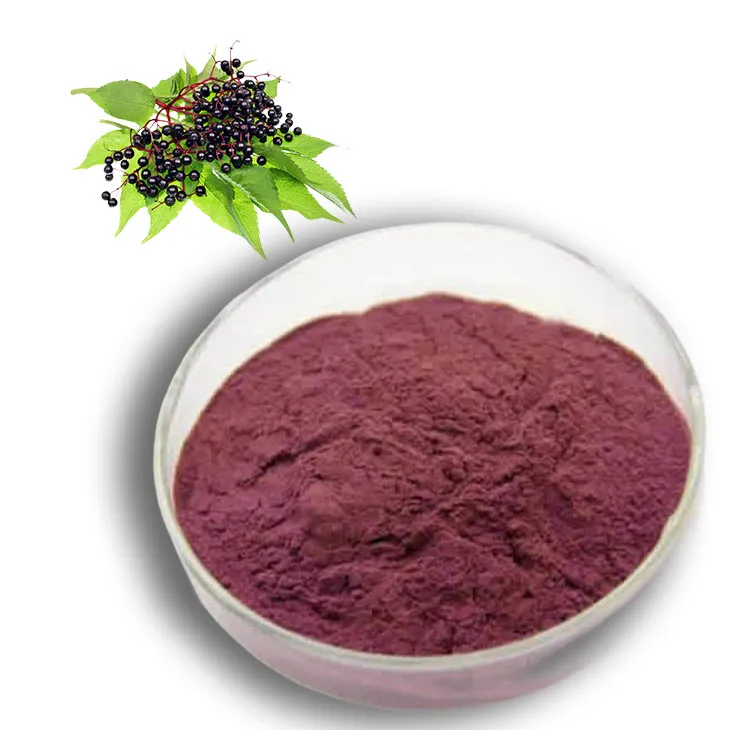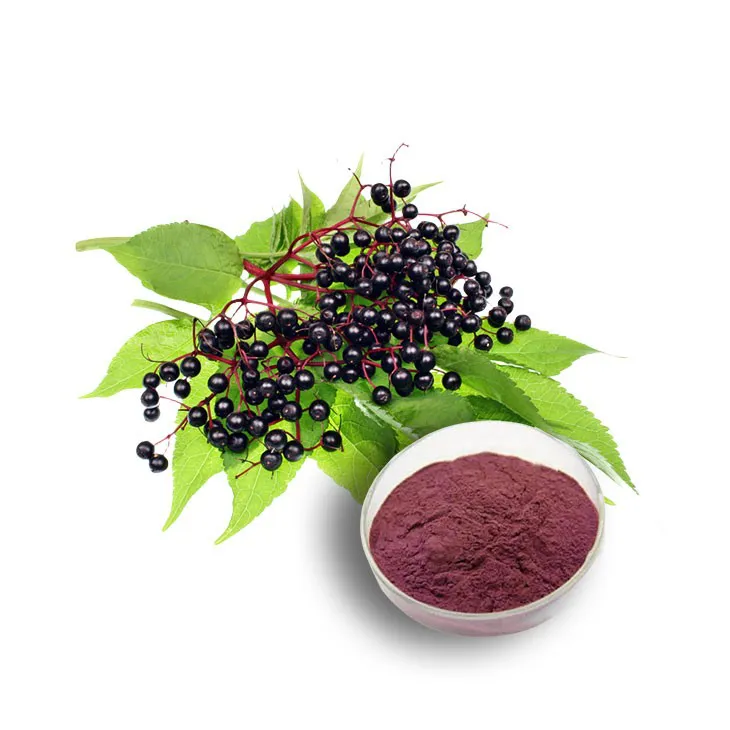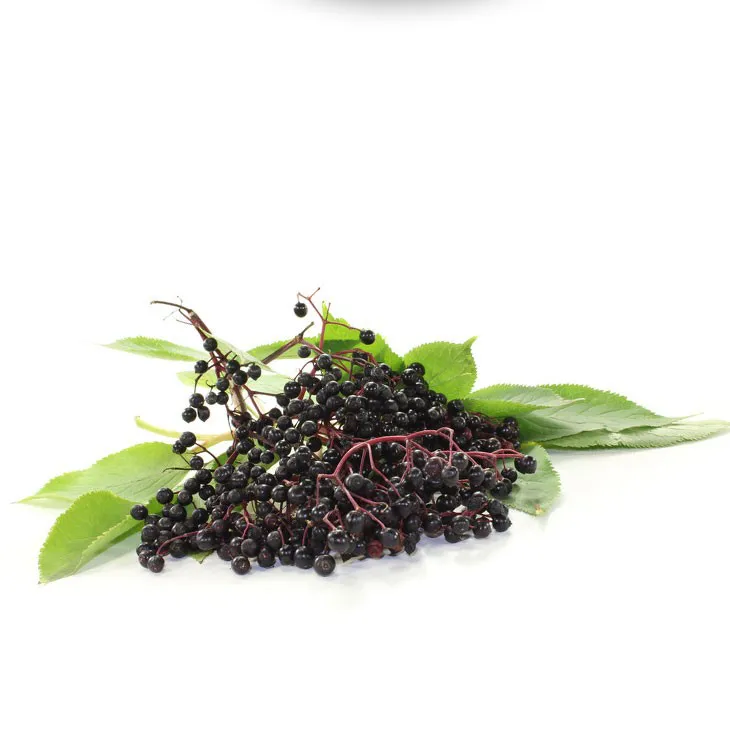- 0086-571-85302990
- sales@greenskybio.com
Elderberry Extract: Is the Extract Effective for Weight Loss?
2024-11-11

1. Introduction
In the quest for effective weight loss solutions, many natural substances have come under the spotlight. Elderberry extract is one such candidate that has piqued the interest of those looking to shed pounds. The elderberry, scientifically known as Sambucus nigra, has a long history of use in traditional medicine for various health benefits. But does it hold any real potential for weight loss? This article aims to explore this question in detail, examining the possible mechanisms through which Elderberry Extract might influence body weight.

2. Nutritional Components of Elderberry Extract
Elderberry Extract contains a variety of nutrients that could potentially play a role in weight management.
2.1 Vitamins
It is rich in vitamins such as vitamin C, which is known for its antioxidant properties. Antioxidants can help combat oxidative stress in the body. While vitamin C itself may not directly cause weight loss, it can support overall health. A healthy body is more likely to function optimally in terms of metabolism, which is crucial for weight management.
2.2 Minerals
Elderberry extract also contains minerals like potassium. Potassium is important for maintaining proper electrolyte balance in the body. This balance is necessary for normal muscle function, including the muscles involved in physical activity. Regular physical activity is a key factor in burning calories and losing weight.
2.3 Polyphenols
One of the most significant components of elderberry extract is its polyphenols. These are plant compounds with powerful antioxidant and anti - inflammatory properties. Some polyphenols may influence the body's fat - metabolizing processes. For example, they could potentially enhance the activity of enzymes involved in breaking down fats.

3. Potential Impact on Metabolism
Metabolism plays a central role in weight loss. A faster metabolism means the body burns more calories at rest.
3.1 Thermogenesis
Elderberry extract might increase thermogenesis in the body. Thermogenesis is the process by which the body generates heat, and this process requires energy. Some of the components in elderberry extract could stimulate the body's brown adipose tissue. Brown adipose tissue is specialized in burning calories to produce heat, unlike white adipose tissue which stores fat. By increasing thermogenesis, elderberry extract could potentially boost the body's calorie - burning rate.
3.2 Influence on Metabolic Enzymes
As mentioned earlier, the polyphenols in elderberry extract may interact with metabolic enzymes. These enzymes are responsible for various biochemical reactions in the body, including those related to the breakdown and synthesis of fats, carbohydrates, and proteins. If elderberry extract can enhance the activity of enzymes involved in fat breakdown, such as lipases, it could lead to increased fat utilization and potentially contribute to weight loss.

4. Appetite Regulation
Another important aspect of weight loss is appetite regulation. Controlling the amount of food consumed is essential for creating a calorie deficit.
4.1 Hormonal Influence
Elderberry extract could potentially affect hormones related to appetite. For example, it might influence the levels of ghrelin and leptin. Ghrelin is often referred to as the "hunger hormone" as it stimulates appetite. Leptin, on the other hand, is the "satiety hormone" that signals the brain when the body has had enough to eat. If elderberry extract can modulate these hormones in a way that reduces ghrelin levels and increases leptin sensitivity, it could help individuals feel fuller for longer and thus consume fewer calories.
4.2 Impact on Digestive Function
The extract may also have an impact on digestive function. A healthy digestive system is more likely to process food efficiently, which can influence how quickly the body feels satisfied after a meal. Some components in elderberry extract could potentially slow down the rate of gastric emptying. Slower gastric emptying means that food stays in the stomach longer, leading to a longer - lasting feeling of fullness.
5. Clinical and Scientific Evidence
While there are theoretical reasons to believe that elderberry extract could be beneficial for weight loss, scientific evidence is still somewhat limited.
5.1 Animal Studies
Some animal studies have shown promising results. In these studies, animals fed with elderberry - supplemented diets have demonstrated changes in body weight and body composition. For example, there have been reports of reduced fat mass in rodents given elderberry extract. However, it's important to note that animal studies cannot always be directly translated to humans.
5.2 Human Studies
In human studies, the evidence is less conclusive. There have been a few small - scale trials looking at the effects of elderberry extract on weight loss. Some of these trials have reported minor weight loss or improvements in body composition markers among participants taking elderberry extract supplements. But more large - scale, well - designed studies are needed to confirm these initial findings.
6. Considerations and Precautions
Before considering elderberry extract as a weight loss aid, there are several important considerations and precautions to keep in mind.
6.1 Dosage
Determining the appropriate dosage of elderberry extract is crucial. Taking too much or too little may not yield the desired effects. There is currently no standardized recommended dosage for weight loss purposes. Moreover, excessive intake of elderberry extract could potentially lead to adverse effects.
6.2 Allergies and Sensitivities
Some individuals may be allergic to elderberries. Allergic reactions can range from mild symptoms such as skin rashes to more severe reactions like difficulty breathing. People with known allergies to related plants should exercise caution when considering elderberry extract.
6.3 Interaction with Medications
Elderberry extract may interact with certain medications. For example, it could potentially interfere with drugs used to treat diabetes or high blood pressure. If you are taking any medications, it is essential to consult a healthcare provider before starting elderberry extract supplementation.
7. Conclusion
In conclusion, elderberry extract contains components that have the potential to influence weight loss through various mechanisms such as affecting metabolism and appetite regulation. However, the current scientific evidence is not yet strong enough to firmly establish it as an effective weight loss aid. While animal studies have shown some promising results, human studies are still in their early stages and more research is needed. Additionally, when considering elderberry extract for weight loss, one must take into account factors such as dosage, allergies, and potential interactions with medications. Overall, while elderberry extract may hold some potential in the realm of weight loss, it should not be considered a magic solution and should be used with caution.
FAQ:
Question 1: What are the main nutritional components in Elderberry extract that might be related to weight loss?
Elderberry extract contains various nutrients such as vitamins (like vitamin C), antioxidants, and flavonoids. Vitamin C is important for overall health and may play a role in metabolism. Antioxidants can help reduce oxidative stress in the body which might indirectly influence metabolic processes. Flavonoids have been studied for their potential anti - inflammatory properties, and chronic inflammation can sometimes be associated with metabolic disorders related to weight gain. However, more research is needed to clearly establish how these components directly contribute to weight loss.
Question 2: How could Elderberry extract potentially affect metabolism?
Some theories suggest that the antioxidants in Elderberry extract could enhance mitochondrial function. Mitochondria are the powerhouses of cells and are crucial for metabolism. By improving their function, the body may be able to burn calories more efficiently. Also, if the anti - inflammatory properties of the flavonoids in the extract help reduce inflammation in metabolic tissues such as adipose tissue and liver, it could improve metabolic processes like glucose and lipid metabolism. But at present, there is not conclusive evidence to firmly prove this effect on metabolism in relation to weight loss.
Question 3: Does Elderberry extract have an impact on appetite regulation?
There is currently no direct evidence indicating that Elderberry extract has a significant impact on appetite regulation. While some natural substances can interact with hormones related to hunger and satiety, there is no research to show that Elderberry extract works in this way. However, if it improves overall health and metabolic function, it could potentially have an indirect effect on appetite in the long run, but this is still speculative.
Question 4: Are there any scientific studies specifically on Elderberry extract for weight loss?
There are some studies looking at the health benefits of Elderberry extract, but relatively few that focus specifically on weight loss. Most of the existing research on Elderberry extract is centered around its antioxidant, anti - viral, and immune - enhancing properties. More targeted research on its role in weight loss is needed to draw definitive conclusions.
Question 5: Can Elderberry extract be used as a sole supplement for weight loss?
No, Elderberry extract should not be considered as a sole supplement for weight loss. Weight loss is a complex process that involves multiple factors including diet, exercise, and overall lifestyle. While Elderberry extract may potentially have some benefits related to metabolism or health in general, it cannot replace the fundamentals of a balanced diet and regular physical activity for achieving weight loss goals.
Related literature
- The Nutritional and Therapeutic Properties of Elderberry"
- "Antioxidants in Elderberry: Potential Health Benefits"
- "Metabolic Effects of Plant - Based Extracts: A Review with Focus on Elderberry"
- ▶ Hesperidin
- ▶ Citrus Bioflavonoids
- ▶ Plant Extract
- ▶ lycopene
- ▶ Diosmin
- ▶ Grape seed extract
- ▶ Sea buckthorn Juice Powder
- ▶ Fruit Juice Powder
- ▶ Hops Extract
- ▶ Artichoke Extract
- ▶ Mushroom extract
- ▶ Astaxanthin
- ▶ Green Tea Extract
- ▶ Curcumin
- ▶ Horse Chestnut Extract
- ▶ Other Product
- ▶ Boswellia Serrata Extract
- ▶ Resveratrol
- ▶ Marigold Extract
- ▶ Grape Leaf Extract
- ▶ New Product
- ▶ Aminolevulinic acid
- ▶ Cranberry Extract
- ▶ Red Yeast Rice
- ▶ Red Wine Extract
-
Saponin Extract
2024-11-11
-
Astaxanthin
2024-11-11
-
Uridine-5'-monophosphate Disodium salt
2024-11-11
-
Tinospora cordifolia extract
2024-11-11
-
Oyster Mushroom Extract Powder
2024-11-11
-
Ivy Extract
2024-11-11
-
Artichoke Leaf Extract
2024-11-11
-
Sea buckthorn oil
2024-11-11
-
White Peony Extract
2024-11-11
-
Baicalin
2024-11-11





















